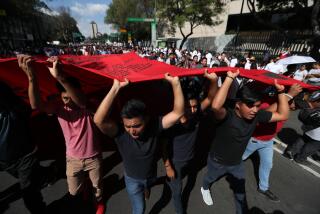Guatemala Rescinds Bus Fare Boost After Bloody Protests
- Share via
GUATEMALA CITY — The government Wednesday canceled a bus fare increase that had led to widespread protests and a military occupation of the national university campus.
Guatemala’s chief of state, Gen. Oscar Mejia Victores, said at a news conference that the new 15-cent bus fare will be rolled back to 10 cents.
Mejia met with his economic Cabinet, including Finance Minister Armando Gonzalez and Economic Minister Ariel Rivera, on Wednesday morning before the decision to rescind the fare increases was announced.
“In order to end the serious incidents that have developed in the capital, the transportation price increase will be suspended,” said government spokesman Ramon Zelada Carrillo.
Announces Price Freezes
Earlier in the day, Mejia announced price freezes on basic goods and promised pay raises for workers after students led protests over increased bus fares and food prices.
At least six people have been killed and 18 others injured in the protests. Police arrested 941 people. Fourteen buses were also destroyed in street rioting and 18 stores looted. National police detained 516 people.
Military officials said 500 soldiers in armored vehicles moved onto the University of San Carlos campus shortly before midnight Tuesday, a few hours after riot police used tear gas against demonstrators at the university’s Plaza of the Martyrs.
The tear gas attack on the students was the second in as many days. Violence broke out Monday after the government raised the bus fares.
$2-Million Monthly Subsidy
Mejia said Wednesday that the government will provide a $2-million monthly subsidy to operators of city buses to make up for reduced fares.
The general also said the costs of basic goods, such as beans, rice and cooking oil, will be held at current levels. He promised unspecified “salary adjustments” for public employees and said similar changes will be made in the private sector “to reduce the effects of the economic crisis that affects us.”
It was the second time this year that the government backed off on emergency economic measures after widespread protests. The military is scheduled to return the nation to civilian rule in January.
Mejia came to power in 1983 after a coup by the army. He said in a radio speech Wednesday that occupation of the campus was necessary to preserve law and order.
Currency Clampdown
Mejia also said that the government will clamp down on black market speculation in the national currency, the quetzal. The official exchange rate with the U.S. dollar is one to one but is being traded on the streets for up to 3.25 to the dollar.
The university’s rector, Eduardo Meyer Maldonado, called the army occupation “an abuse of power,” noting that the school has been independent of the government since 1944. He said it was the first time troops had occupied the campus, situated in the southern part of the city.
But the nation’s second in command, Gen. Rodolfo Lobos Zamora, called the university “a command center for terrorist activity . . . where there have been assassinations, there is drug traffic and where we know there are arms.”
More to Read
Sign up for Essential California
The most important California stories and recommendations in your inbox every morning.
You may occasionally receive promotional content from the Los Angeles Times.












